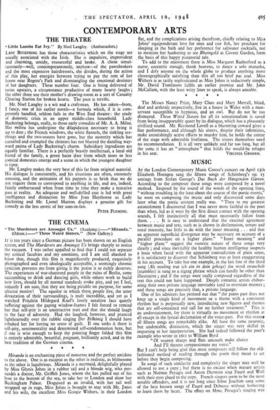THE CINEMA
" The Murderers are Amongst Us." (Academy.) " Miranda."
(Odeon.)—" Three Weird Sisters." (New Gallery.) .
1T is ten years since a German picture has been shown on an English screen, and The Murderers are Amongst Us brings sharply to notice the vacuum. I was rather appalled to find that I could not separate my critical faculties and my emotions, and I am still abashed to know that, though this film is magnificently produced, exquisitely photographed and even idealogically acceptable, a seemingly chronic cynicism prevents me from giving it The praise it so richly deserves. The experiences of war-shattered people in the ruins of Berlin, some succumbing to drink and dancing girls, while others work to build new lives, should by all normal standards evoke pity, and yet I feel, unjustly I am sure, that they are being pitiable on purpose, for some ulterior motive! The squalor in which these, people live, the utter devastation of their surroundings, is truly incredible, and yet as I watched Fraulein Hildegard Knef's lovely sensitive face quietly suffering against the gaping window-frames I felt forced to remind her that self-pity' is an unattractive trait and that she should laugh in the face of adversity. Had she laughed, however, and pranced lightheartedly over the rubble singing Der Erlkonig I should have rebuked her for having no sense of guilt. If one seeks it there is self-pity, sentimentality and determined self-condemnation here, but if one is wise enough to keep the pointing finger folded this film is entirely admirable, beautiful, poignant, brilliantly acted, and in the best tradition of the German cinema.
* * * *
Miranda is an enchanting piece of nonsense and the perfect antidote to the above. One is as escapist as the other is realistic, as blithesome as the other is lugubrious. Miranda is a mermaid, delightfully played by Miss Glynis Johns in a rubber tail and a blonde wig, who per- suades a doctor, Mr. Griffith Jones, whom she has pulled out of his boat to the bottom. of the sea, to take her to London and show her Buckingham Palace. Disguised as an invalid, with her tail well wrapped up in rugs, Miss Johns is brought to stay with Mr. Jones and his wife, the excellent- Miss Googie Withers, in their. London
flat, and the complications arising therefrom, chiefly relating to Miss Johns' equiponderant love for men and raw fish, her penchant for sleeping in the bath and her preference for saltwater cocktails, not to mention her hankering to see Rheingold at Covent Garden, form the basis of this happy piscatorial tale.
To add to the enjoyment there is Miss Margaret Rutherford as a nurse, eccentric enough, thank heavens, to dance a solo mazurka, and I defy anyone on the whole globe to produce anything more choreographically satisfying than this all too brief pas seul. Miss Withers is as tartly sophisticated as Miss Johns is seductively simple, Mr. David Tomlinson fulfils an earlier promise and Mr. John McCallum, with the least witty lines to speak, is always amiable.
* * * * The Misses Nancy Price, Mary Clare and Mary Merrall, blind, deaf and arthritic respectively, live in a house in Wales with a man- servant susceptible to hypnosis, and an owl. But do not be too dismayed. Three Weird Sisters for all its sensationalism is saved from being insupportably queer by its dialogue, which has a pleasantly civilised sound. Mr. Raymond Lovell as a blustering coward gives a fine performance, and although his sisters, despite their infirmities, make astonishingly active efforts to murder him, he holds the centre of the stage with admirable liveliness. The sisters themselves need no recommendation. It is all very unlikely and far too long, but all the same it has an " atmosphere " that holds the would-be refugee






























 Previous page
Previous page